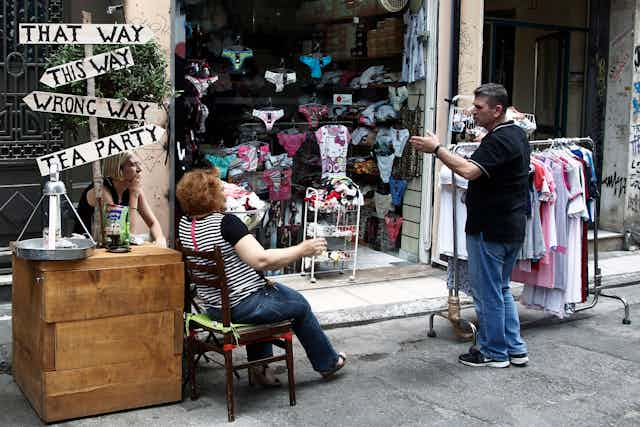The world will come to an eerie halt in the first week of July to watch the unfortunate endgame fast unfolding between Greece and its creditors. It has been a pretty ugly and detestable squabble over $70 billion that, according to some, has cost roughly about $1 trillion already.
Many trillions will be down the gurgler, yet there is absolutely no economic fulcrum on which the impasse has been pivoting. In order to understand the dynamics of failed negotiations and continuing conflicts between the troika and the Greek government let me borrow the much-celebrated parable from 2005 prize-winning game theorists, Thomas Schelling and Robert Aumann.
The theory of conflict and cooperation
Imagine that the Greek government is placed at the edge of a precipice, restrained by a chain that is tied to its ankle and then fastened to the ankle of the troika.
Both will be rescued and only one of them will win a large prize (read vain-glory) as soon as the other rolls over. Thomas Schelling posited that each party has only one method to persuade the other to give in - namely, threatening to push the other off the precipice.
The threat is not credible since a big push will ensure doom for both. A big push is thus nothing but collective lunacy. Yet each side has an incentive to dance recklessly close to the precipice to convince the other that one is stupid enough to embrace a higher risk to create an accidental annihilation of both.
Whoever can dance more recklessly will win the game, which is figuratively a race to the bottom. There is some evidence that the troika has outsmarted the Greek government in terms of its reckless behaviour. Consequently, the troika has imposed a new, punitive and more devastating austerity package on the Greek government in its latest round of negotiations.
In other words, the Greek government could not signal sufficient recklessness to the troika and is, hence, staring down the barrel of another bout of policy-driven deep recessions that the troika seeks to dump on Greeks.
Politics, not economics
Most impartial observers will find it difficult not to think that economics was just the façade under which dirty power-games, domination, arm-twisting and negative politics had vitiated the negotiation process. Any decent economist with a modest track-record would fail to decipher the economic rationale behind the troika’s policy prescriptions for Greece since 2010.
Most Goliaths in economics have unequivocally opposed the adjustment programs imposed by the troika on Greece, which sent the Greek economy into deep crisis and the resulting GDP decline of 25% since 2010. The welfare implications of this are stark and confronting: there are now 1 million households in Greece who survive only on pensions of grandparents while youth unemployment has shot past 60%. The string of pigheaded policy blunders of the troika created crises after crises in Greece.
It seems the troika has no accountability whatsoever as it now demands a further restraint on the government spending for Greece to achieve a budget surplus of 3.5% by 2018.
This will spell further economic doom for the ailing Greek economy, as most economists will argue, economic depression will never leave the Greek soil and most Greek households will suffer untold miseries from a further contraction of the economy. So, the referendum will be a test on the Greek penchant for masochism: how much more pain can the Greek people absorb by supporting the ludicrous austerity measures and violent reform packages of the troika?
The devil you know - or the unfathomable unknown?
Back to the application of game theory: the rejection of the package will have potentially unfathomable adverse consequences for Greece. So, the Greek voters now face an unusual dilemma: they either approve the known devil – the austerity- they have been living with during the last five dreadful years. Alternatively, they put the austerity package in the bin and walk out of the eurozone, regaining control over monetary policy from the European Central Bank (ECB) and putting up a real fight to drive off recessions out of Greece.
Yet the Greek voters, however insulted they are by the troika, cannot gauge the potential risk from breaking away from the ECB and then possibly from the EU. Though many pundits believe the Greeks will happily choose a punitive strategy in the referendum in order to punish the troika by dismembering the eurozone, the picture is not at all clear. The fear of unknown and unfathomable consequences from the separation from the ECB can persuade the voters to herd with others by meekly rubber-stamping the austerity package of the troika.
The potential presence of herd mentality in voting can create a socially inefficient, erroneous and possibly profligate outcome in Greece since – despite a plethora of private signals that reveal the right choice/action – voters can still herd on the incorrect and costly choice of new austerity measures with a positive probability.
One can thus never be sure what will be outcome of the referendum in Greece - it is rather unpredictable, which makes the Greek referendum all the more interesting.

